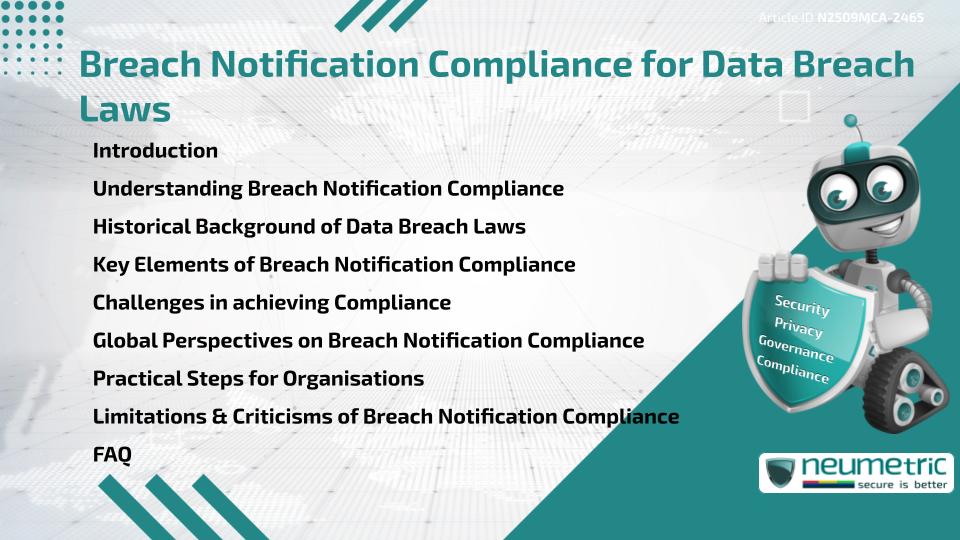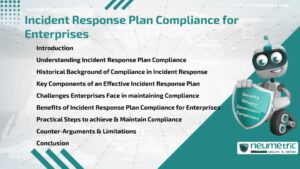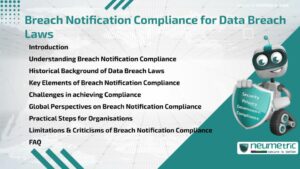Table of Contents
ToggleIntroduction
Breach Notification Compliance refers to the legal & regulatory obligations Organisations must follow when a data breach occurs. These requirements often include notifying affected individuals, regulatory authorities & sometimes the public. Governments worldwide have enacted data breach laws to ensure transparency, accountability & protection of Personal Information. Understanding Breach Notification Compliance is crucial for Organisations that handle Sensitive Data, as non-Compliance can lead to severe fines, reputational harm & legal consequences. This article explores the historical context, practical challenges, global perspectives & Best Practices for achieving Breach Notification Compliance.
Understanding Breach Notification Compliance
At its core, Breach Notification Compliance involves informing Stakeholders when unauthorized access, disclosure or theft of Personal Data occurs. Notification timelines, methods & content vary depending on jurisdiction. For example, the General Data Protection Regulation (GDPR) requires notification within seventy-two (72) hours, while the California Consumer Privacy Act (CCPA) mandates timely disclosure without specific timelines. These laws ensure individuals can take protective measures against fraud, identity theft or misuse of their data.
Historical Background of Data Breach Laws
The concept of Breach Notification Compliance first gained prominence in the early 2000s when California enacted its pioneering data breach notification law. Over time, other U.S. states followed & international frameworks such as GDPR set global benchmarks. Historical events, including high-profile cyberattacks on corporations & Government agencies, accelerated the push for stronger legal frameworks. Today, nearly every major economy enforces some form of breach notification law.
Key Elements of Breach Notification Compliance
Most data breach laws outline several common elements:
- Timeliness: Organisations must notify within a set timeframe.
- Transparency: The notification must clearly describe the breach, compromised data & recommended actions.
- Authority Involvement: Regulatory bodies often need to be informed.
- Record Keeping: Companies must maintain Evidence of Compliance.
These elements emphasize fairness, transparency & accountability in how Organisations handle breaches.
Challenges in achieving Compliance
Breach Notification Compliance can be complex due to overlapping laws, cross-border data flows & evolving Cyber Threats. Organisations face challenges such as:
- Identifying a breach quickly.
- Determining whether notification is legally required.
- Coordinating responses across jurisdictions.
- Balancing transparency with reputational concerns.
Small & medium-sized enterprises (SMEs) often struggle more due to limited resources.
Global Perspectives on Breach Notification Compliance
Countries differ widely in their approach. The European Union’s GDPR emphasizes strict timelines & severe penalties. The United States follows a patchwork approach, with each state having its own law. In Asia, countries like Japan & Singapore have introduced frameworks tailored to local business practices. Despite differences, all laws share a common purpose: to protect individuals by ensuring prompt disclosure of data breaches.
Practical Steps for Organisations
Organisations can strengthen their Breach Notification Compliance strategies by:
- Conducting regular Risk Assessments.
- Developing clear Incident Response plans.
- Training Employees on reporting protocols.
- Using encryption & Security Measures to minimise exposure.
- Establishing communication channels with regulators & affected individuals.
These steps not only improve Compliance but also build trust with Customers & Stakeholders.
Limitations & Criticisms of Breach Notification Compliance
While Breach Notification Compliance improves transparency, it has limitations. Frequent notifications may cause “alert fatigue” among consumers, reducing effectiveness. Laws often focus on reactive measures instead of preventive ones. Critics also argue that inconsistencies across jurisdictions create Compliance burdens, especially for multinational companies. Nonetheless, these laws remain a cornerstone of Data Protection.
Takeaways
Accountability & Transparency after a Data Breach is ensured by Breach Notification Compliance. Though challenging, Organisations that adopt strong security practices, prepare Incident Response plans & understand jurisdictional laws can navigate Compliance successfully. Doing so protects both their Customers & their reputation.
FAQ
What is Breach Notification Compliance?
Breach Notification Compliance is the process of meeting legal obligations to notify affected parties & authorities after a data breach.
Why is Breach Notification Compliance important?
It is important because it promotes transparency, helps individuals protect themselves & ensures Organisations remain accountable.
How quickly must a breach be reported?
This depends on the jurisdiction. GDPR requires notification within seventy-two (72) hours, while U.S. laws vary by state.
What are common challenges in Breach Notification Compliance?
Challenges include identifying breaches promptly, understanding complex regulations & managing cross-border incidents.
Do all countries have breach notification laws?
Not all, but most major economies do. The scope, timelines & penalties vary significantly.
How can Organisations prepare for Compliance?
Organisations should create Incident Response plans, train staff & establish clear communication procedures.
What are the penalties for non-Compliance?
Penalties range from Financial fines to reputational damage & increased scrutiny by regulators.
Can over-notification reduce effectiveness?
Yes, excessive notifications can lead to alert fatigue, making individuals less responsive to real Risks.
References
- General Data Protection Regulation (GDPR)
- California Consumer Privacy Act (CCPA)
- California Data Breach Reporting
- Singapore Personal Data Protection Commission
- Japan Act on the Protection of Personal Information
Need help for Security, Privacy, Governance & VAPT?
Neumetric provides organisations the necessary help to achieve their Cybersecurity, Compliance, Governance, Privacy, Certifications & Pentesting needs.
Organisations & Businesses, specifically those which provide SaaS & AI Solutions in the Fintech, BFSI & other regulated sectors, usually need a Cybersecurity Partner for meeting & maintaining the ongoing Security & Privacy needs & requirements of their Enterprise Clients & Privacy conscious Customers.
SOC 2, ISO 27001, ISO 42001, NIST, HIPAA, HECVAT, EU GDPR are some of the Frameworks that are served by Fusion – a SaaS, multimodular, multitenant, centralised, automated, Cybersecurity & Compliance Management system.
Neumetric also provides Expert Services for technical security which covers VAPT for Web Applications, APIs, iOS & Android Mobile Apps, Security Testing for AWS & other Cloud Environments & Cloud Infrastructure & other similar scopes.
Reach out to us by Email or filling out the Contact Form…





